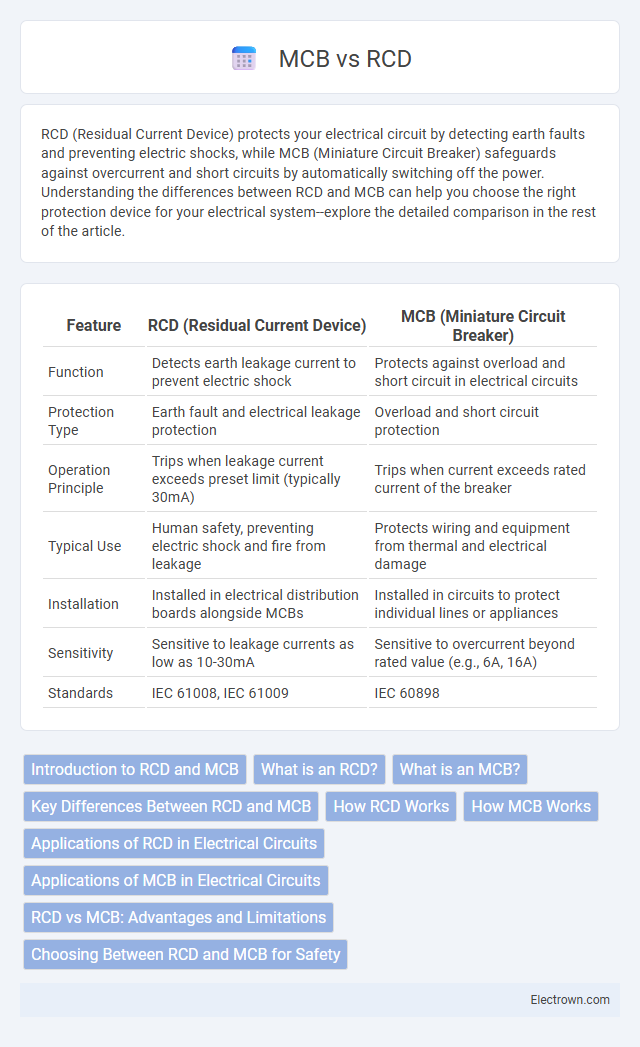RCD (Residual Current Device) protects your electrical circuit by detecting earth faults and preventing electric shocks, while MCB (Miniature Circuit Breaker) safeguards against overcurrent and short circuits by automatically switching off the power. Understanding the differences between RCD and MCB can help you choose the right protection device for your electrical system--explore the detailed comparison in the rest of the article.
Table of Comparison
| Feature | RCD (Residual Current Device) | MCB (Miniature Circuit Breaker) |
|---|---|---|
| Function | Detects earth leakage current to prevent electric shock | Protects against overload and short circuit in electrical circuits |
| Protection Type | Earth fault and electrical leakage protection | Overload and short circuit protection |
| Operation Principle | Trips when leakage current exceeds preset limit (typically 30mA) | Trips when current exceeds rated current of the breaker |
| Typical Use | Human safety, preventing electric shock and fire from leakage | Protects wiring and equipment from thermal and electrical damage |
| Installation | Installed in electrical distribution boards alongside MCBs | Installed in circuits to protect individual lines or appliances |
| Sensitivity | Sensitive to leakage currents as low as 10-30mA | Sensitive to overcurrent beyond rated value (e.g., 6A, 16A) |
| Standards | IEC 61008, IEC 61009 | IEC 60898 |
Introduction to RCD and MCB
RCD (Residual Current Device) and MCB (Miniature Circuit Breaker) are essential electrical safety devices designed to protect your home and appliances from electrical faults. An RCD detects and disconnects circuits when it senses leakage current, preventing electric shocks and reducing fire risk, while an MCB safeguards against overloads and short circuits by automatically switching off power. Understanding the distinct roles of RCD and MCB helps ensure comprehensive electrical protection for your installations.
What is an RCD?
A Residual Current Device (RCD) is a safety device designed to quickly disconnect electrical circuits when it detects an imbalance between live and neutral currents, indicating a leakage that could cause electric shock. Unlike Miniature Circuit Breakers (MCBs) that protect against overloads and short circuits, RCDs specifically prevent electrocution and fire hazards by monitoring leakage currents as low as 30mA. Installing an RCD enhances electrical safety by providing protection within milliseconds, especially in residential and wet environments.
What is an MCB?
An MCB (Miniature Circuit Breaker) is an electrical device designed to protect your electrical circuit from damage caused by overcurrent or short circuits by automatically switching off the electrical flow. It functions as a switch that interrupts current flow whenever it detects an overload or fault, ensuring the safety of wiring and appliances. Unlike an RCD, which protects against earth faults, an MCB specifically safeguards circuits from excess current to prevent fires and equipment damage.
Key Differences Between RCD and MCB
RCD (Residual Current Device) protects against earth leakage currents by detecting imbalance between live and neutral wires, preventing electric shocks. MCB (Miniature Circuit Breaker) safeguards circuits from overcurrent and short circuits by automatically disconnecting when current exceeds a preset limit. Understanding the distinction helps you ensure comprehensive electrical safety by using RCD for personal protection and MCB for device and wiring protection.
How RCD Works
An RCD (Residual Current Device) works by continuously monitoring the electric current flowing through live and neutral wires, detecting any imbalance caused by leakage current. When it senses a difference exceeding a preset threshold, typically 30mA or less, it quickly disconnects the power supply to prevent electric shock or fire hazards. You benefit from enhanced safety as the RCD reacts within milliseconds to potentially dangerous ground faults, unlike an MCB (Miniature Circuit Breaker) that only protects against overload and short circuits.
How MCB Works
MCB (Miniature Circuit Breaker) works by automatically switching off electrical circuits when it detects an overload or short circuit, preventing damage and electrical fires. It uses a bimetallic strip that bends under excess current and an electromagnet that trips the switch instantly during short circuits. Your electrical system stays protected as the MCB quickly halts current flow, ensuring safety and reliability.
Applications of RCD in Electrical Circuits
RCDs (Residual Current Devices) are essential in electrical circuits for protecting against electric shock by detecting leakage currents and disconnecting power swiftly. They are widely applied in residential, commercial, and industrial settings to enhance safety in areas with high moisture, such as bathrooms and kitchens, where the risk of ground faults increases. Your electrical system benefits from RCDs by preventing fire hazards and ensuring compliance with safety standards.
Applications of MCB in Electrical Circuits
MCBs (Miniature Circuit Breakers) are widely used in electrical circuits for protection against overloads and short circuits, ensuring safety in residential, commercial, and industrial installations. They effectively interrupt fault currents and prevent damage to wiring and equipment, making them essential for circuit integrity and operational reliability. Your electrical system benefits from MCBs' quick response to electrical faults, minimizing downtime and enhancing overall circuit protection.
RCD vs MCB: Advantages and Limitations
RCDs (Residual Current Devices) offer superior protection against electrical shocks by detecting earth leakages, while MCBs (Miniature Circuit Breakers) primarily guard against overloads and short circuits. RCDs excel in preventing fatal electric shocks but do not protect against overload currents, whereas MCBs effectively interrupt excess current flows yet cannot detect leakage currents. Combining RCDs and MCBs enhances electrical safety by addressing both leakage and overcurrent hazards in residential and commercial installations.
Choosing Between RCD and MCB for Safety
RCD (Residual Current Device) and MCB (Miniature Circuit Breaker) serve distinct protective functions in electrical circuits: RCD detects earth leakage currents to prevent electric shocks, while MCB protects against overloads and short circuits. When choosing between RCD and MCB for safety, your decision should prioritize RCD for personal protection against electrical faults that could cause injury, and MCB for safeguarding wiring and appliances from damage due to excess current. For optimal safety, combining both devices is often recommended, as this approach covers both shock prevention and circuit protection comprehensively.
RCD vs MCB Infographic

 electrown.com
electrown.com